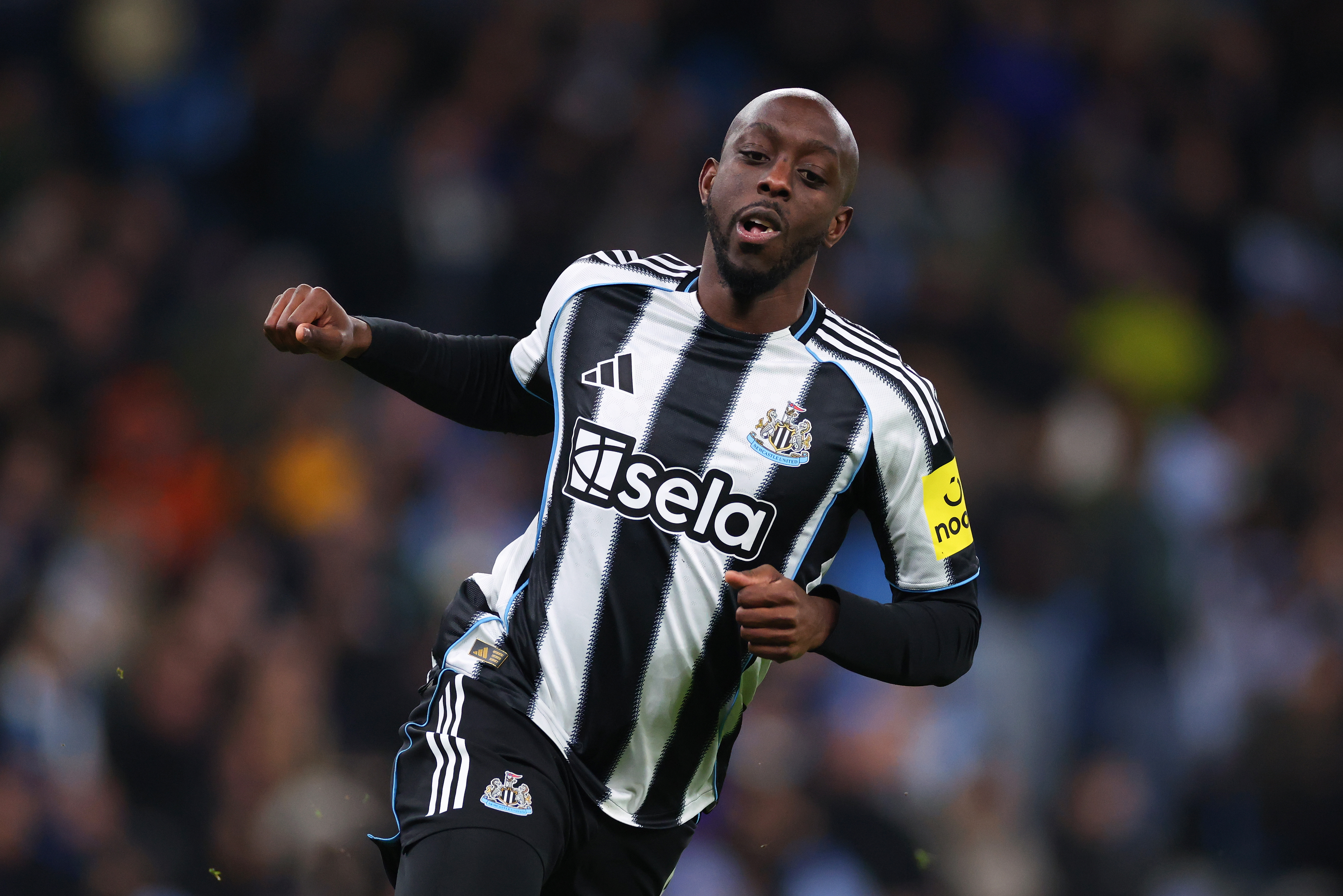Derby County's shocking 2007/08 revisited: the Premier League's worst ever season, told by those who were there
Derby County endured misery, torment and torture during the 2007/08 season, with no Premier League side having come close to their dismal, record-breaking campaign
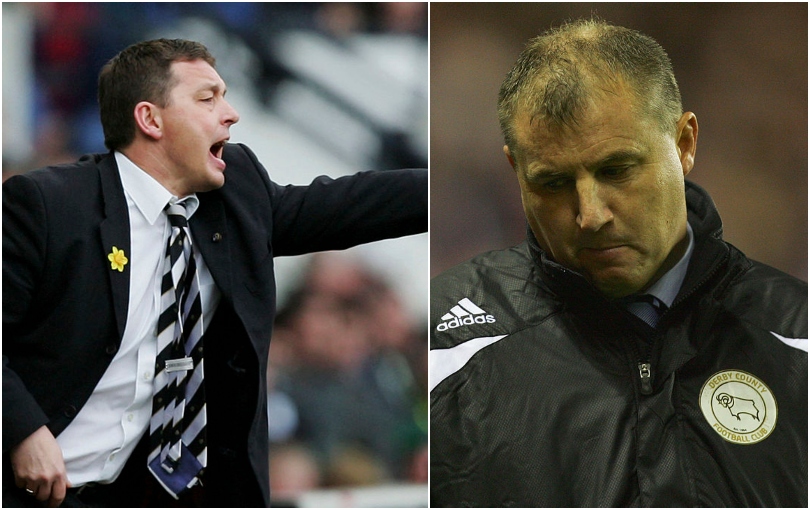
The best features, fun and footballing quizzes, straight to your inbox every week.
You are now subscribed
Your newsletter sign-up was successful
Want to add more newsletters?

Five times a week
FourFourTwo Daily
Fantastic football content straight to your inbox! From the latest transfer news, quizzes, videos, features and interviews with the biggest names in the game, plus lots more.

Once a week
...And it’s LIVE!
Sign up to our FREE live football newsletter, tracking all of the biggest games available to watch on the device of your choice. Never miss a kick-off!
Join the club
Get full access to premium articles, exclusive features and a growing list of member rewards.
Derby County are simply the worst Premier League side to have played in England's top flight. Of that there is no doubt. 2007/08 proved a gut-wrenching campaign for all involved, with moment after moment seeing the Rams sink to even lower depths.
Pertinently, a silence descended over Pride Park as Stiliyan Petrov set his sights from near the halfway line, sending a shot high into the air. Winless since September, relegated by March and already 2-0 down to Aston Villa after half an hour, this was the final insult for Derby County. Goalkeeper Roy Carroll’s woeful clearance had landed straight on Petrov’s chest, and everyone in the stadium knew where the Bulgarian’s effort was going to drop. Right in the top corner.
“It was his weaker foot too,” Darren Moore said of the strike when speaking to FourFourTwo in 2017. “When it screamed into the net I thought, ‘Goodness me, it just ain’t happening for us’.”
“Martin O’Neill said to me, ‘Well he’s never done that before,’” Paul Jewell said. “Managers used to say that a lot during the season. If anything could go wrong, it did.”
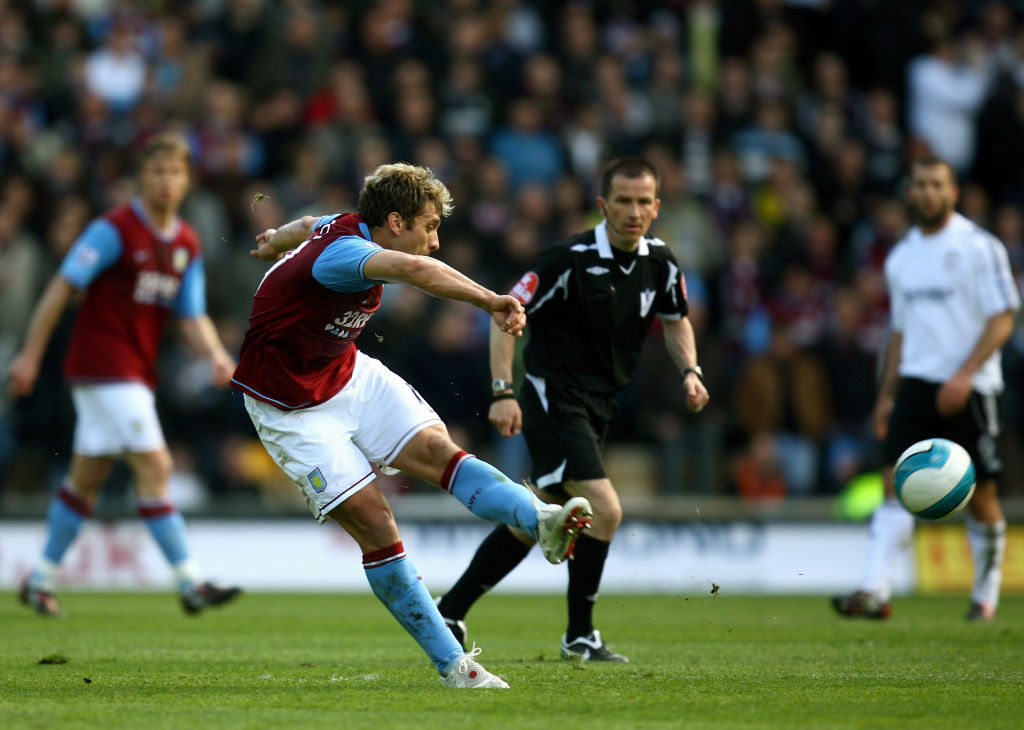
Derby County reach new low in Premier League campaign
Derby would lose 6-0 on that April afternoon. They would collect only 11 points in 2007/08, a Premier League record at the time of writing. The records didn’t stop there: fewest wins (one), most defeats (29), fewest goals scored (20), most goals conceded in a 38-game season (89), longest run without victory (32 matches), earliest relegation (March 29), furthest adrift of 19th place (24 points)... the list goes on and on. It is a campaign that will forever be burned into the psyche of every Derby supporter who witnessed it.
“We still wonder how that ever happened,” Simon Kirk commented, a season-ticket holder during that fateful campaign over a decade ago. “How could we have been quite that bad?”
FFT took a deep breath and dialed the number. If we’re being honest, we weren't sure how the phone call was going to go. We were attempting to speak to Billy Davies, a man who steadily gained a reputation as one of football’s feistiest characters, about one of the most difficult times of his managerial career.
The best features, fun and footballing quizzes, straight to your inbox every week.
But we needn’t have worried. “It was a happy time, an extremely happy time,” he interjected, as we delicately tried to explain why we’re calling him. It’s quickly clear Davies is actually glad we have phoned: he wants his say about a period he believes has been misrepresented.
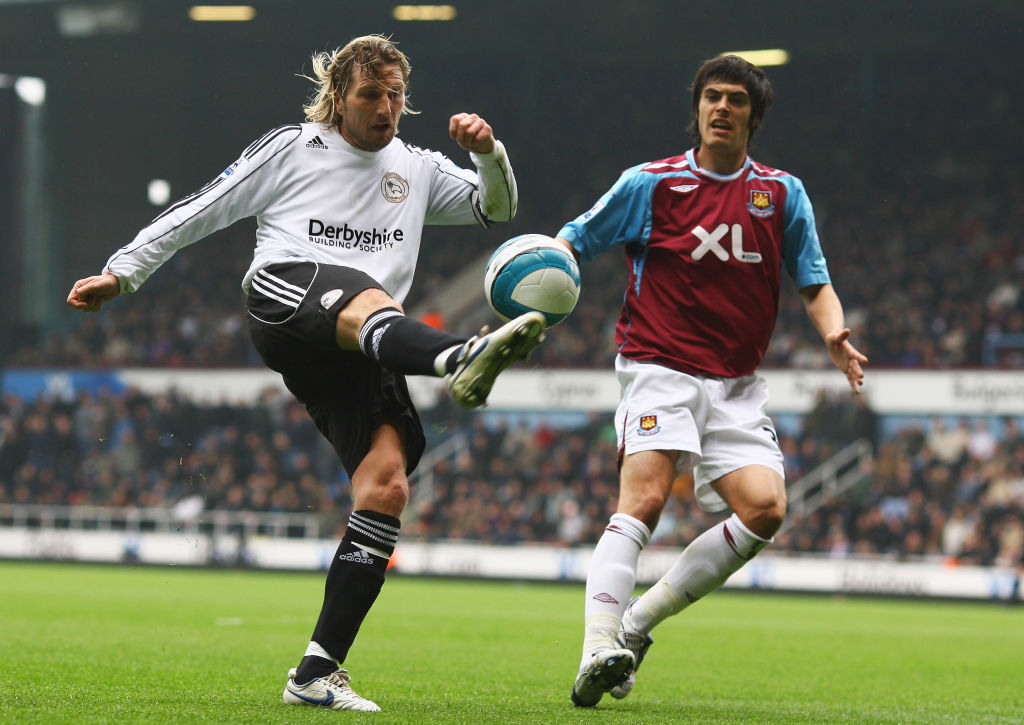
The happy time he’s referring to is not the Premier League season, of course, but his time at Derby as a whole, during which he guided them to promotion against all expectations. The Scot arrived in the summer of 2006, shortly after local businessman Peter Gadsby had completed his takeover of a club who had been in financial trouble. “The club had just avoided relegation,” Davies explained. “I’d signed a three-year contract and the agenda was clear: year one mid-table, year two top 10, year three promotion. At no point at the beginning of that season did anyone consider promotion to be on the agenda.”
And yet by February they were six points clear at the top of the Championship. “We had a wonderful group of players who were all happy to listen to the advice of the manager and the staff,” Davies continued. “We had organisation, discipline, spirit and togetherness.”
West Brom, Wembley... and rows
Those latter two qualities would be tested by the first of several problems over the next 15 months: a row over bonuses. If the club secured promotion, players signed that season would not be due the same bonus as the other squad members. “If you’ve got a team, then you can’t have any bonus issues – it’s got to be a rule for one and all,” Davies said. “Unfortunately there were discrepancies between the new players and the old players. It caused a great deal of grief.”
With Davies making his feelings clear behind the scenes, his relationship with the managing director, Mike Horton, became increasingly tense. The Professional Footballers’ Association was then called in to try to resolve the bonus dispute, but Derby would slide to third place by the end of the season. Despite that, the Rams dug deep in the play-offs, seeing off Gareth Bale’s Southampton after a penalty shootout before narrowly overcoming West Brom at Wembley to secure promotion. Stephen Pearson’s strike gave them their 13th 1-0 win of the campaign.
“We weren’t the better team on the day but we just stuck together,” Craig Fagan, in the starting line-up that afternoon, said. “As a team we kept grinding out results.”
“I remember feeling absolutely joyous,” defender Moore revealed, of the moment the final whistle blew. “At 33, I was relishing the chance to play against the Ronaldos and the Rooneys again. I was so proud.”
There was no apprehension at that moment: only happiness. “In my 35 years of watching Derby County, it was the greatest feeling ever,” supporter Carl Walker told FFT.
The euphoria wouldn’t last too long, though. Just minutes after the final whistle, Davies was non-committal when asked about his future. The interview made the headlines. “This is where misrepresentation kicked in,” he insisted. “Sections of the press claimed I had made it the Davies Show. They asked me a question about next season, but what they didn’t know was I’d had a call when I was sitting in the hotel in Southampton, the day before the first leg of the play-off semi-final.”
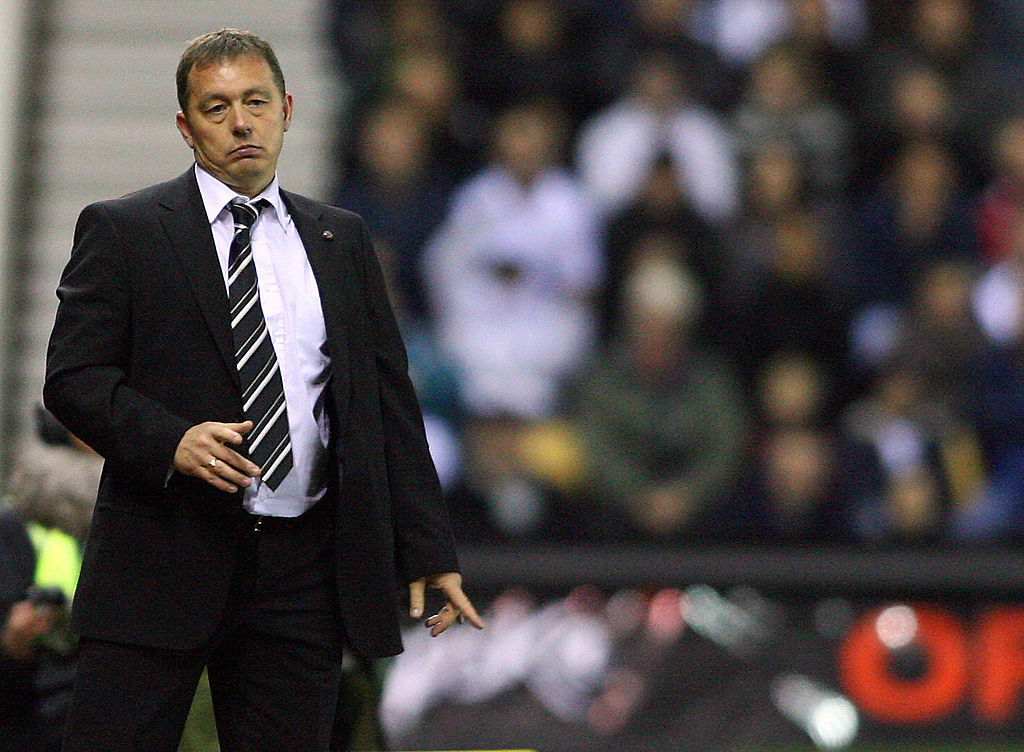
The call came from a contact, telling him that a takeover of the club may be afoot, and his position as manager appeared to be in jeopardy as a result. “I immediately called a meeting with the staff,” he said. “I told them that no matter what happens, it looks as if we’re going to be out of the door come the summer. After the play-off final, what I said was, ‘I don’t know if I’ll be here next season.’ The press never clarified with me why I said that. I was trying to say that something’s going on. They tried to make it out that it was the Davies Show, but it wasn’t – Davies had a knife in his back.”
Davies still felt the prospect of a takeover badly hampered his attempts to strengthen the squad that summer. “Peter Gadsby was excellent and told me what was happening – that they were going to become an outgoing board,” he added, stressing that he retained a good relationship with the County chairman. “Unfortunately, because of that, the agenda changed and that’s when things went wrong. It was pretty clear that we weren’t going to be spending any proper money that summer to compete.
“We’d achieved something that was unthinkable – promotion after just 11 months, two years too early. But we had an ageing, mid-table Championship team. I gave the board options for new signings and the board decided they would pick the cheaper options. We were chasing guys such as Matthew Etherington and Carlton Cole in their heyday, and yet we weren’t getting them in. If I say that there are six or seven options, and options one to four are players who’ll help to make Derby a competitive Premier League club, but the owners opt to bring in options five, six and seven, they can’t complain too much about the outcome. You can’t spend only £10 million in the Premier League and expect to compete.”
Supporters were frustrated, too – though many felt the funds available could still have been used better. “It wasn’t so much that we weren’t spending the money, it was what was coming in,” Stewart Smith, who wrote the book Bad Worse Worst about the disastrous 2007/08 campaign under the pseudonym Edgar Smith, said. “Rob Earnshaw for £3.5m, Claude Davis, Kenny Miller, Tyrone Mears, Andy Todd, Andy Griffin, a young American called Benny Feilhaber who barely played. The local paper had a billboard saying, ‘Rams sign international’ – it was Eddie Lewis from Leeds. It wasn’t inspiring.”
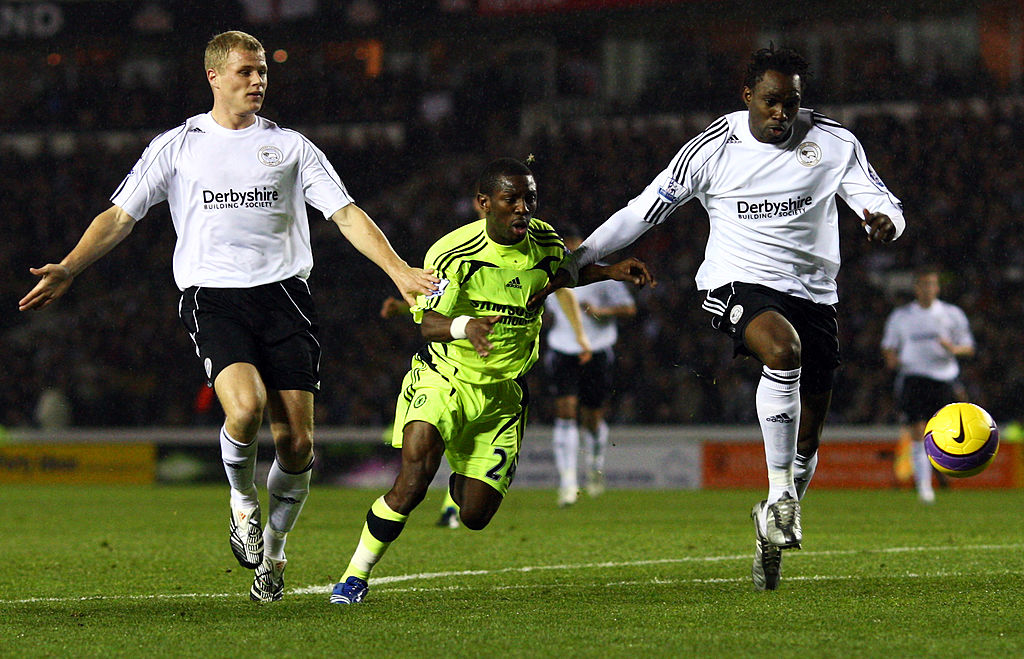
Optimism wasn’t exactly rampant, though things looked rosy five minutes into the new season when Matt Oakley put Derby ahead at home to Portsmouth. “We were chanting, ‘We are top of the league,’” fan Kirk recalled with a smile. The game ended 2-2 with Todd levelling late on, before a 1-0 defeat at Manchester City – respectable, albeit against a City side who incredibly hadn’t managed to score a league goal at Eastlands since January 1.
A 4-0 spanking at Tottenham – the Rams were losing 2-0 inside six minutes and three down after 14 – was followed by a home defeat to Birmingham, and already County were rock bottom of the table. Bookmakers Paddy Power had promised to pay out on the club going down if they failed to win at Liverpool on September 1. They lost 6-0.
“Fernando Torres was on fire and you came off the pitch glad it was only six, not 10 or 11,” Fagan admitted. “Our aim had always been just to stay up, but we weren’t quite at our sharpest early in the season and were found out really quickly.”
Finding it particularly tough was £3m centre-back Davis, voted Derby’s worst-ever player in an FFT poll. “He looked out of his depth,” Stewart Smith said. “He wasn’t alone, but he was the poster boy of everything that went wrong.”
Kenny Miller was only 39 minutes into his debut when he delivered the greatest moment – in fact the only great moment – of Derby’s Premier League campaign. Newcastle were the visitors for Monday Night Football when a long kick fell at the Scotsman’s feet and he hammered a half-volley into the net from 30 yards. It was not the sort of goal that could be repeated every week, but it gave County a 1-0 win – their sole victory of the entire season. Derby were off the bottom of the table, just above Sammy Lee’s Bolton Wanderers.
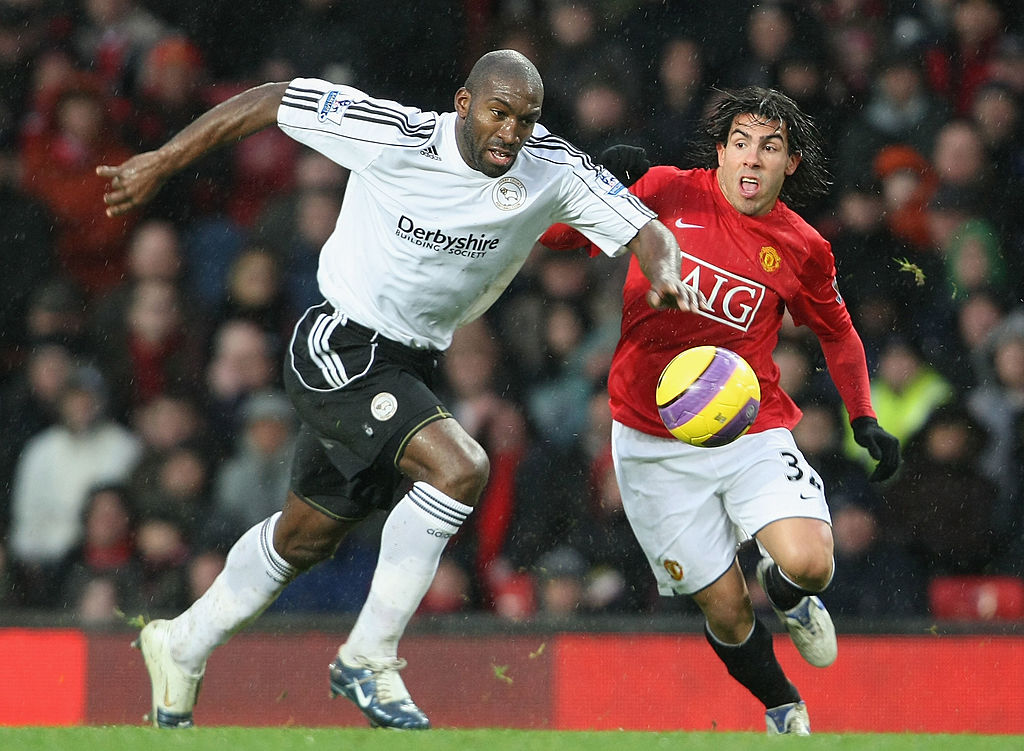
“We were thinking, ‘Great, here we go now’,” Smith said. “But it wasn’t street parties. It was September, you expect to win a dozen games a year.”
Since the formation of the Football League almost 120 years earlier, only Loughborough had gone through a season winning one match, in 1899/1900. Stark reality swiftly returned in the form of a 5-0 defeat at Arsenal, thanks to a hat-trick by Emmanuel Adebayor and a rare Abou Diaby goal. Within a month Derby were bottom of the table again – where they’d remain for the rest of the campaign. Gadsby made way as chairman and Adam Pearson arrived to take over the position, with a view to attracting new investment.
Micky Mouse club: Disney in Derby takeover talks
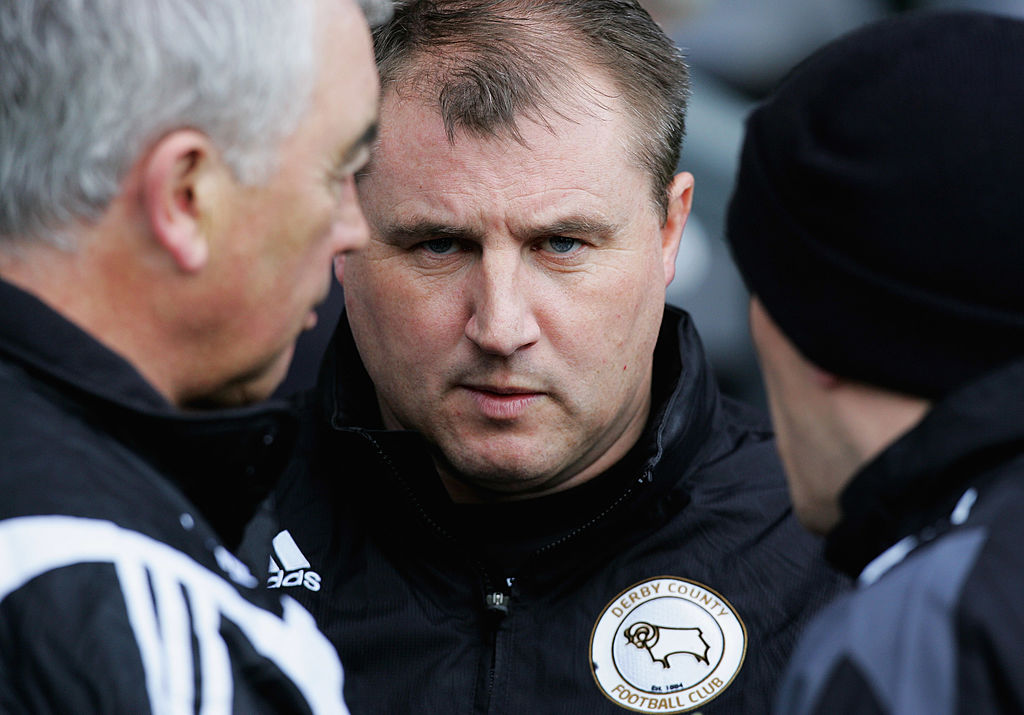
In early November, after a 5-0 home loss to West Ham – including a goal by summer target Etherington – news broke that Pearson was in discussions with an American consortium, potentially involving Roy Disney, nephew of Walt. “Mickey Mouse club: Disney in Derby takeover talks,” read the newspaper headline.
Davies had been tipped off that Pearson would be arriving as part of the transition to new owners. When that happened, he suspected his time would soon be up. “Let me find you a quote,” he said, pausing briefly. “It’s from Adam Pearson. He said, ‘Billy Davies has the board’s full support, I believe that Billy’s the right man for the job.’ But I knew exactly what was going to happen.”
Believing his exit to be inevitable, Davies went on the offensive. The Rams performed creditably in a 2-0 defeat at home against Chelsea, but Davies complained to the press post-match that Pearson did not speak to him often enough, bemoaning a lack of investment in new signings and insisting that the current team were not good enough.
“I sat down with my advisers and we knew the thing that had to come up was where did all the money go from winning promotion?” Davies explained. “After Chelsea we decided that was the time to talk about it, because there were plenty of people talking about the club – the manager is s**t, the players are s**t. Not one ounce of respect was given to a group of players and staff who’d achieved something marvellous. Lo and behold, at 8pm that evening, it was nice to talk to Adam Pearson. He phoned and asked me to meet up with him – I knew what was going to happen.”
Davies also reckoned he had a good idea who Pearson wanted to replace him. “I’d heard that Adam Pearson would be coming in with Paul Jewell,” he said. “When I met Adam, the first thing I did was to wish him and Paul Jewell all the best. He said, ‘What are you talking about?’ I replied, ‘Adam, this is not my first week in football, and it’s certainly not yours.’”
Davies departed the club that morning – cancelling plans to attend that evening’s East Midlands Sports Awards to receive their coach of the year honour. Two days later, Jewell was appointed – though the Liverpudlian stresses that he had not held talks prior to Davies’ exit.
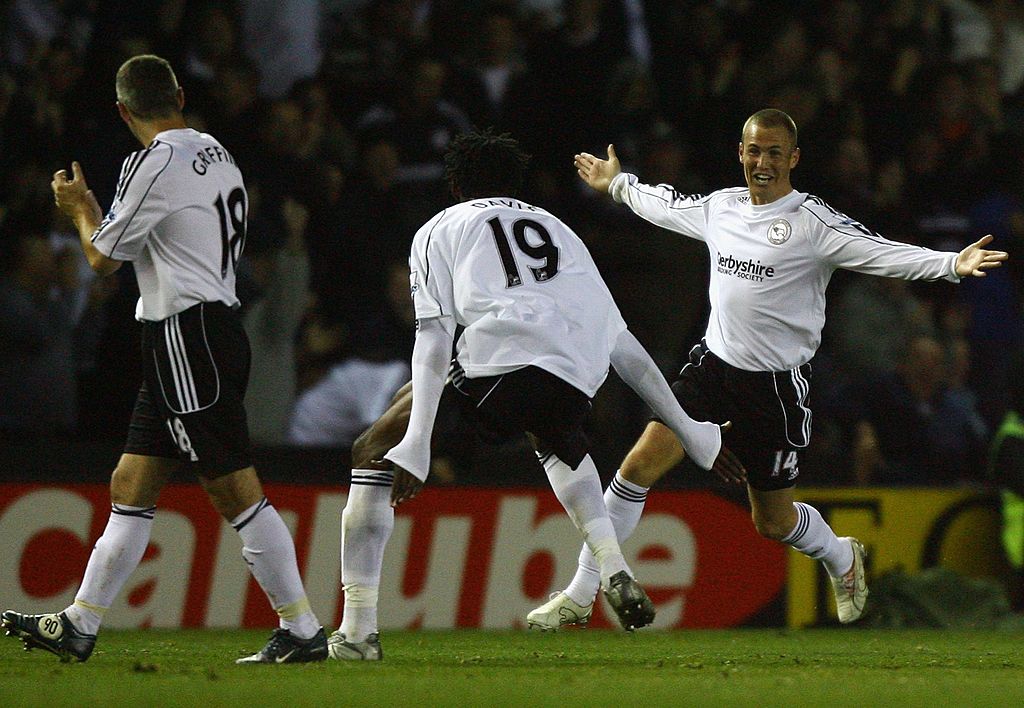
“I’ll tell you exactly what happened,” Jewell said, who guided both Bradford and Wigan into the top flight, leaving the Latics at the end of the previous season to take a break from the game. “I was playing golf in August when I got a call from an agent. He asked me if I was interested in the Derby job. I told him two things: first, they’ve got a manager so this conversation is ending here, and I’ve just left a good team at Wigan. No disrespect to Derby, but why would I want to take over at a team that are probably not ready for the Premier League?
“That was the end of the conversation, but unfortunately it got leaked in the newspaper. I don’t know how. The same agent rang me later and we had a tete-a-tete because he thought I had told the press and I thought he’d told them. But I’d done nothing wrong. Someone’s phoned me up and offered me Billy’s job – that happens in football, but it doesn’t happen with me.
“The first time I met Adam was after Billy left – I was in London and I got a call saying he would like to speak to me. I said I didn’t think it was something for me, but I met with him and was really impressed. He showed me the training ground and it was magnificent. With the stadium and 35,000 home supporters, that’s what turned my head, and I agreed to go there.”
Jewell knew he had taken a risk. “I remember David Moyes phoning me and saying not to go to Derby,” he revealed. “He said Everton had played them not long ago and that Derby wouldn’t win another game all season. I laughed it off at the time... but it turned out to be true.
The Rams were still only four points adrift of safety at that stage, with six points – and five goals scored – from 14 games, but Jewell felt team spirit was lacking too. Disgruntlement over the change of manager hadn’t helped. If many fans didn’t mourn Davies’ departure, some players felt differently.
“We’d played unbelievably against Chelsea – I remember not giving Claudio Pizarro and Andriy Shevchenko a kick,” Moore explained. “There was a really good feeling in the dressing room afterwards – I felt we’d cracked it. But then Billy left and it pulled the rug from under us. I was gutted about it. I really did believe in him – his tactical awareness, his motivation, his leadership. Had he remained, we might not have stayed up, but we would have been in the late 20s or early 30s for points by the end. Billy picked up six points and Paul Jewell came in for the last 24 games and only got five.”
Jewell’s early matches in charge were frustrating. “In my first game away at Sunderland [on December 1], they scored in the 93rd minute to beat us 1-0,” the manager said. “The first home game was against Middlesbrough, Tuncay scored a goal-of-the-season contender and we lost 1-0. We were winning 2-1 at Newcastle with three minutes to go, our centre-half slipped and [Mark] Viduka made it 2-2. And then over Christmas we were 1-0 up against Blackburn and got a penalty, Steve Howard missed it and we lost. We never got any momentum going.”
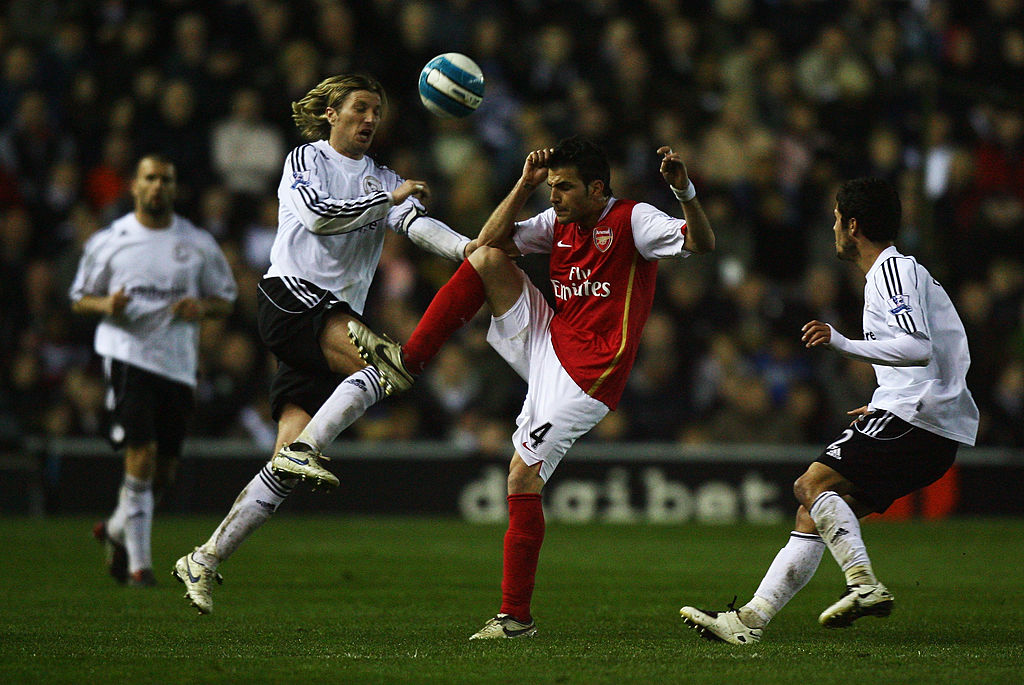
Jewell decided he needed to spend in the January transfer window. “That was the biggest mistake I made,” he admitted. “I went to Adam Pearson and said to him, ‘Look, we are so bad and we need to give the supporters something to hold on to.’ What I should have done instead was keep all of the money and then strengthen for the Championship, but I didn’t want to hold my hands up and admit that we were going down without even trying.
“We didn’t spend millions and millions of pounds, but we did spend £1.5m on Robbie Savage and signed Emanuel Villa, Laurent Robert, Mile Sterjovski and Roy Carroll. We brought in a lot of players who didn’t improve the squad too much. The team were short – no doubt about it. I’ve spoken to players who were there at the time, and in the dressing room they knew they weren’t just short of Premier League quality, but hopelessly short.”
Danny Mills arrived on loan, only to pick up an injury in his second league match and return to Manchester City. Fellow new arrival Alan Stubbs also had injury problems, earning the dubious honour of being involved with the two worst teams in Premier League history – he had been in the Sunderland squad who earned just 15 points in 2005/06. The club’s American takeover happened at the end of January, but by then the season was irretrievable. As Derby’s winless streak stretched on, the relationship between Jewell and his squad deteriorated. “We were hoping we’d be watching Match of the Day that season, but the way it was going we didn’t want to be on there,” Fagan revealed. “We were getting exposed by the media, and by our own boss to be honest. Often it was ‘you lot’ and not ‘us’. Each interview was, ‘These players aren’t good enough.’ Some of the senior players were surprised by a few of the things that were said.”
Jewell did admit that he might have handled things differently. “Some players seemed resigned to it,” he said. “That’s the thing I found difficult, the way we went down without a fight at times. At Wigan I was forthright with players and they responded to it – but at Derby some of them couldn’t. That was probably one of my failings as a manager. If I ever went back into the game I’d probably have to change my style to suit the more fragile players.”
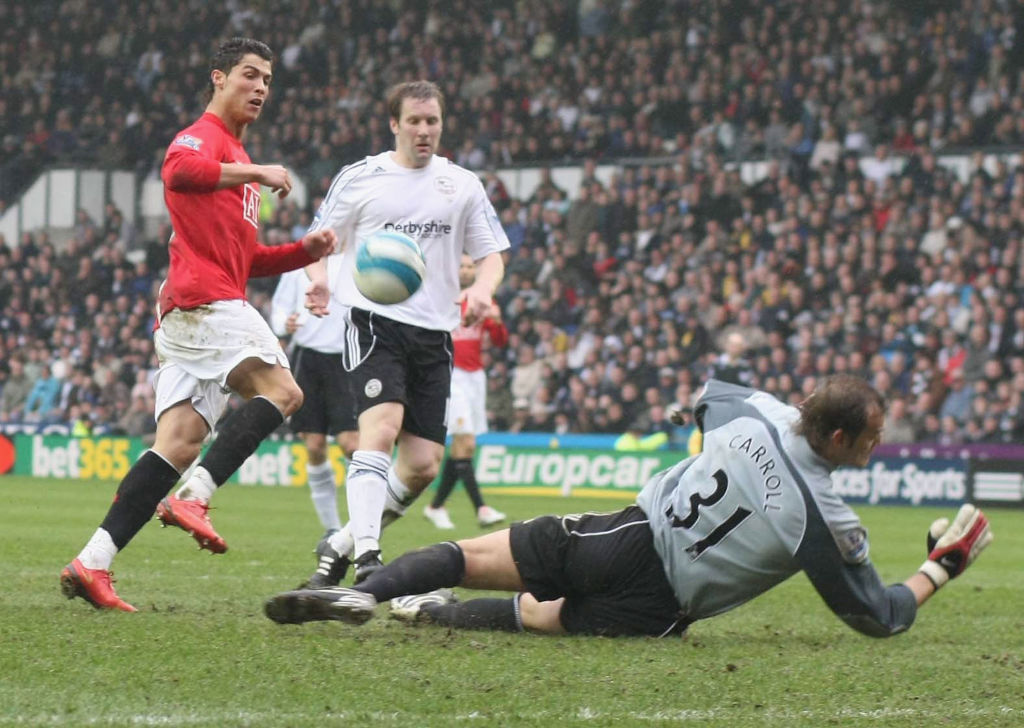
Things got even worse for Jewell when he found himself on the front page of the News of the World, after a homemade sex tape filmed six years earlier found its way into the hands of the media. Six days later, a miserable week was rounded off by County’s relegation – the only team in Premier League history to go down in March. It happened on a day when they actually picked up a point, too, at home to Fulham.
With half a dozen games still to go, fans hoped their team could at least end the season playing with a bit of freedom. Instead came the 6-0 battering at home to Villa.
“Early on we really went at Villa but just couldn’t score,” Moore said. “I walked down the tunnel at half-time and Gareth Barry said to me, ‘Darren, how are we 3-0 up?’ I said, ‘It’s been the story of our season, Gaz’.”
Loyal to the end
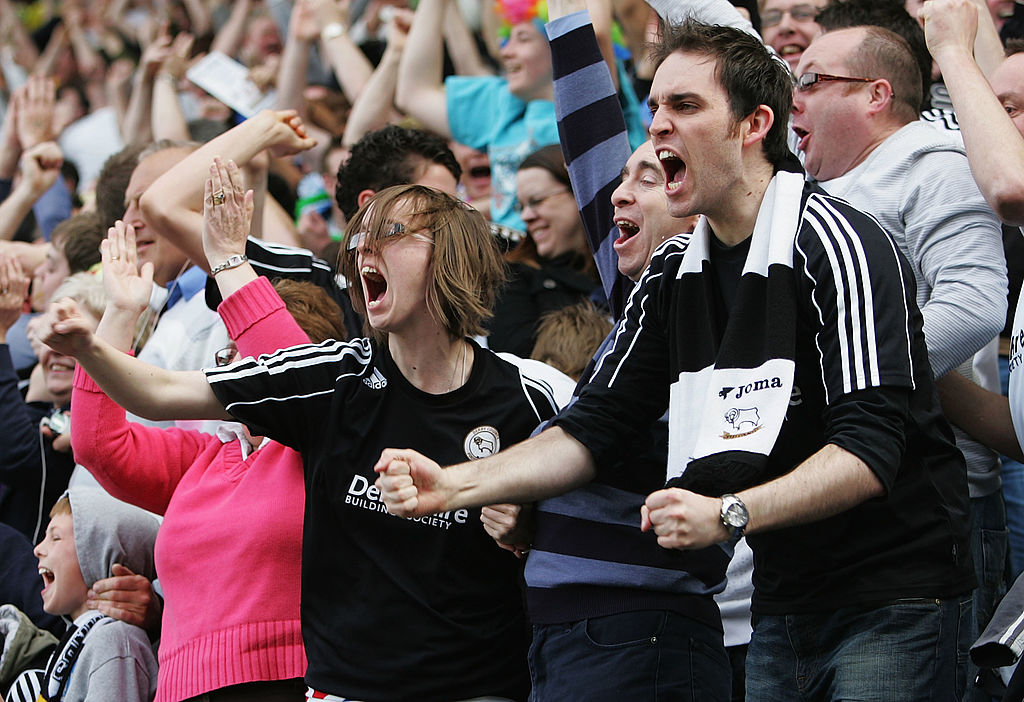
The club’s supporters stayed remarkably loyal – an estimated 7,000 travelled north for Derby’s last away game against Blackburn – but the Villa result seriously tested their resolve. Derby ended the campaign with six straight losses – Adebayor netted another hat-trick in a 6-2 Arsenal romp before Reading won 4-0 at Pride Park on a day when the Royals were relegated themselves.
Jewell admits he’s still embarrassed to be associated with a Premier League record low points total. “Every time it comes up on Sky, I turn the TV down,” the 52-year-old said, who resigned as Derby manager months later with the club 18th in the Championship. “That season completely got me down. My stock had been quite high after Wigan – with hindsight I shouldn’t have gone to Derby.
“It did affect my career, 100 per cent, even though I didn’t work any differently at Derby than at Wigan. Was I a great coach at Wigan? I don’t know. Was I a bad coach at Derby? I don’t know, but I was exactly the same at both and got two different results. But it wasn’t like everything was rosy when I got there – that’s been forgotten quite a bit. It wasn’t a happy club.”
Billy Davies felt things would have been different had he remained in charge. “Look at the stats and you will see bigger Premier League clubs who took fewer points than Billy Davies did at Derby,” he insisted. Like Jewell, he’s been out of management for some time and believes the perception of his time at Derby has not done him any favours.
“If the club had gone for the players recommended in the summer, and allowed us to stay for the January transfer window, then we’d have stayed in the Premier League, of that there is no doubt. They had the right manager and the right staff too – all they had to do was jump on the same page as us. But we were hung out to dry. From day one of going up into the Premier League, we had absolutely no chance.”
Were Derby the worst team in Premier League history? Fagan doesn't believe so. “There have been worse teams, even if others have won a couple more games by luck. Derby haven’t been back in the Premier League since, so we must have had something to get there in the first place.”
Aston Villa’s 17 points in 2015/16 is the closest any side has come to Derby’s tally: fans accept the record may be theirs for some time.
“Every season I’ve got one eye on a promoted team, wondering whether they can do it,” fan Kirk said. “Then it gets to January and they’re past our total. I don’t think it will get broken in my lifetime.”
Moore was one of few players to emerge with any credit from that season, voted player of the year. “I always, always tried my hardest,” he said.
But the overriding feeling is sadness, that the joy of Wembley led only to a season of unprecedented misery. Derby will forever be an example of how not to tackle the Premier League. “When you’re playing the elite, you need everybody singing from the same hymn sheet,” Moore says now. “From the very top it wasn’t right – it breeds contempt throughout the club, and a divided house will always fall.”
This feature originally appeared in the October 2017 issue of FourFourTwo.

Chris joined FourFourTwo in 2015 and has reported from more than 20 countries, in places as varied as Ivory Coast and the Arctic Circle. He's interviewed Pele, Zlatan and Santa Claus (it's a long story), as well as covering the World Cup, AFCON and the Clasico. He previously spent 10 years as a newspaper journalist, and completed the 92 in 2017.
 Join The Club
Join The Club










